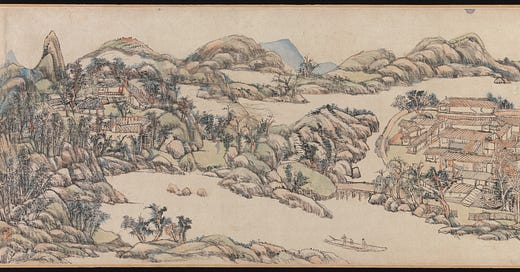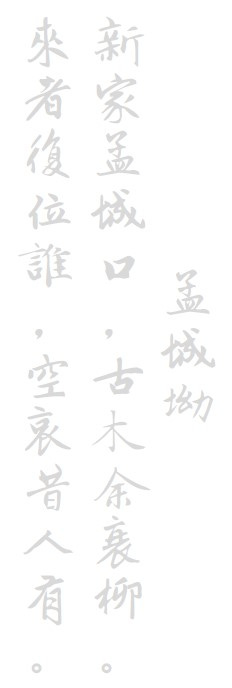The Wang River Collection Wang Wei My estate is in the Wang River valley, and has a number of places worth visiting: the dip by Meng wall, Glory Ridge, the pavilion of rich-grained apricot wood, the bamboo loggers' forest, deer grove, magnolia grove, dogwood by a stream, scholar tree avenue, the lakeside gazebo, Lakeside South Mound, Lake Qi, the willow waves, the Luan farm rapids, Gold Dust Spring, White Boulder Shallows, Lakeside North Mound, the cabin in the bamboo, magnolia hollow, the lacquer plantation, and the pepper orchard. I holidayed there with Pei Di, and we wrote short poems about them. The Dip by Meng Wall My new estate: a few old willows, dying, Vestiges of a park by Meng town wall. So strange to think of future comers sighing So pointlessly for what men had before.
Wang Wei (699-759) was a successful writer and politician. He bought a piece of land outside the city that he could use during the periods when he was not busy in office - an estate already made famous in a poem by Song Zhiwen, who had previously owned it. Authorities in Shaanxi Province believe that they have located the site, of the Wang River estate, but over the 1000 years since the writing of these poems, many of the sites have disappeared.
Wang wrote this classic series of whimsical, lightly fantastical landscape poems with his friend Pei Di. They published their 40 poems together. Here I translate Wang’s poems and provide Pei Di’s in prose translation for reference.
The first in the series illustrates how little we know about Tang poets. The word that I've translated as "dip" is not well understood. It could be a depression in the ground, a valley of some kind, or perhaps even a gap where the old wall has crumbled. The word for wall may mean a gate, or a gap in the wall. Pei Di mentions a house built right under the walls, which could mean that the bricks from the old wall were used to build the house, creating the gap through which people can now pass. But all of this is speculation.
Pei Di's poem at the same site (prose translation):
The house is built under the old walls; sometimes we walk on the old walls. The old walls are not what they used to be; today people pass through them freely.
孟城坳
新家孟城口,古木余衰柳。
来者复位谁,空哀昔人有。




